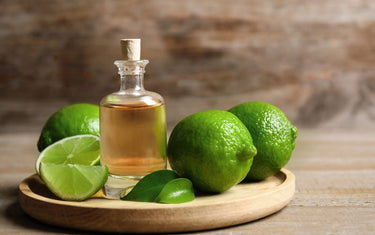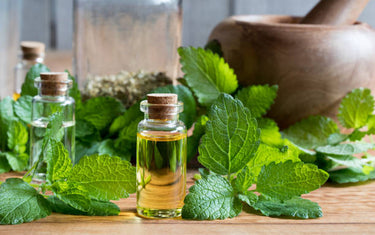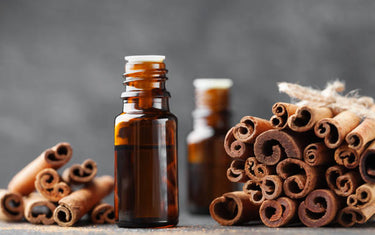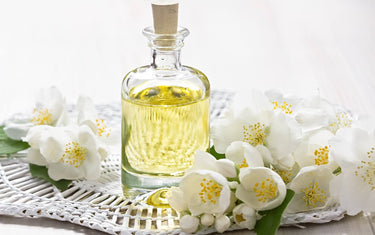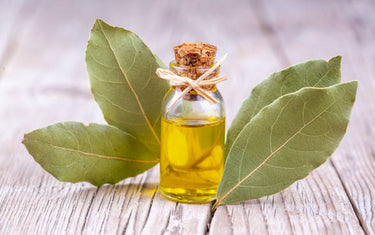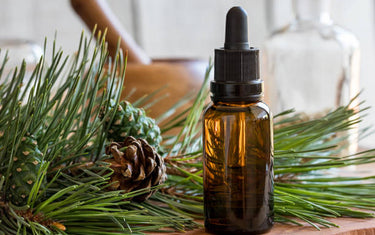10 min read / 2 February 2024 / yasmin sharp
10 Benefits and Uses of Citronella Oil
Explore the versatile benefits and applications of citronella oil, from natural insect repellent to skincare and home cleaning solutions.
Share this post
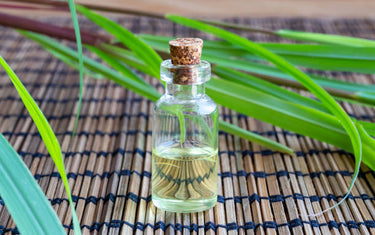
The positive, uplifting notes of citronella are central to the oil’s charm, which also helps to explain its appeal as an insect repellent and aromatherapy favourite.
It is often compared to lemongrass, which is part of its extended family, although it has its own unique features and benefits to offer.
Citronella oil often comes to the forefront during the warmer months of the year, with its refreshing citrus notes proving very effective against flying insects, especially mosquitos.
In recent years it has also gained a reputation for its disinfectant qualities, working as a chemical-free cleaning agent for the home.
We explain more about its cleansing abilities, aromatherapy benefits and much more in this deep dive into everything citronella.
What is citronella oil?Citronella oil is extracted via steam distillation from the stems and leaves of the Cymbopogon plant, which is native to Sri Lanka. It is often confused with lemongrass, and whilst they are different species of the Cymbopogon plant, they do share similar properties. However, only the Cymbopagan nardus and Cymbopagan winterianus varieties are used to make citronella oil, with Ceylon oil made from the former Java oil from the latter. The two oils are almost identical, although Java oil contains a greater amount of geraniol – the most powerful component of citronella oil – which is why it is often more expensive. |
How does citronella oil work?
The natural properties of citronella essential oil have a lot to offer, depending on how you want to apply them.
People who want to relax the mind and body may find that diffusing the oil is just what they need, which can help to uplift negative moods, boost energy and potentially soothe headaches.
Diffusing the oil can also repel mosquitos and other flying insects.
Topical application of citronella oil can be used to improve skin health and slow the signs of ageing by aiding the absorption of moistures.
This makes it a great massage lotion, whilst also deodorising the skin to add a bright and engaging scent.
Citronella essential oil may also be able to help ease certain conditions and ailments.
For example, its medicinal properties can ease and reduce pain, promote wound healing and support weight loss.
The anti-fungal and antimicrobial properties could prove useful as a cleaning agent for your home.

Benefits of citronella oil
To enjoy the benefits of citronella essential oil you can use to:
1. Keep pests at bay
Perhaps one of the best-known benefits of citronella oil is its ability to repel insects.
In fact, the U.S. Environmental Protection Agency considers the oil to be a biopesticide – classing it as a non-toxic mode of action against potential harmful insects.
Diffusing or topically applying citronella essential oil can offer protection against mosquitoes and their bites. [1]
This is particularly true when used in combination with the vanillin compound, helping to shield the skin for up to 3 hours.
This means that compared to commercial mosquito repellents, a diluted citronella mixture has to be applied more regularly to the skin to maintain protection levels, although it does offer a strong, natural alternative.
2. Use it to train dogs indoors
Dogs have a particularly strong aversion to citronella oil, so a good trick to try is to spray furniture or linen with a heavy dilution to keep them away.
However, there are concerns that citronella can be toxic to dogs if consumed in large amounts, so if you have a particularly inquisitive canine that loves to investigate with their tongue, this may not be a suitable solution.
Some owners also use citronella collars as an alternative to electric anti-bark collars, although the RSPCA does not recommend the use of punishment collars of any kind.
If you are a cat owner, you should avoid using citronella on furniture as it can also be harmful and toxic to their health.
3. Offer protection against bacteria and parasites
Several studies have concluded that citronella oil can be effective at eliminating certain parasites.
For example, in 2011, researchers showed that a compound found in citronella, geraniol, is anthelmintic – which means it has the capacity to destroy parasites without affecting the host. [2]
Another study, published in 2016, found that the oil could be used to combat the candida fungus, which is responsible for causing thrush. [3]
Additionally, a 2020 study stated that when used as part of a mouthwash, it can deter and kill harmful bacteria. [4]
Compared to some commercial antibacterial ingredients it can be more effective due to its strong antimicrobial properties.
It also has lower cytotoxicity and does not pose any threat to growing cells.
4. Help to ease and reduce pain
The geraniol compound acts as an anti-inflammatory agent, which expands uses of citronella oil into pain management remedies to ease stubborn coughs, swollen muscles and inflamed skin.
The compound is also classed as an anticonvulsant, which can prove helpful in helping to relax painful muscles.
When diluted and applied to the abdomen, citronella essential oil can also alleviate menstrual cramps.
You can try this at home by diluting citronella oil with a carrier oil of choice and apply it in areas of discomfort to ease and dull pain.
5. Wash your scalp and hair
Your body naturally produces sebum, a waxy oil often found in the scalp.
The application of citronella can help to regulate its production, so if there is an excessive buildup that makes your hair feel too greasy, it could restore a natural balance.
Anecdotal evidence also suggests that citronella oil is helpful for detangling wet hair, leaving it looking shinier, although this may only apply to certain hair types.
Some studies have also found that head lice can be prevented through the use of citronella oil.
A 2004 clinical trial involving 103 children compared use of the oil to a placebo and concluded that it could significantly lower the incidence of re-infestations. [5]

6. Promote wound healing
People with diabetes may be able to benefit from the potential wound healing benefits of citronella oil, as the condition often slows down the repair process.
Research suggests that the antifungal and anti-inflammatory properties of citronella essential oil could accelerate wound healing.
The study looked at how the oil impacted candida-infected wounds in a diabetic mouse model.
However, as of yet, no studies looking at how citronella oil can help people with diabetes have been conducted.
7. Support weight loss
Based on current research, it could be possible that citronella oil benefits could extend to supporting weight loss.
This is based on the results of a 2015 study in rats that looked at how weight could be affected following the inhalation of citronella and some of its compounds. [6]
The results showed that feeding was decreased, whilst weight gain was slowed and cholesterol lowered after the oil had been inhaled.
However, research in this area is limited to date, so more studies are needed to determine how effective the oil could be at controlling weight loss in humans.
8. Calm and relax the mind
One of the most popular citronella oil benefits is its ability to provide calm and clarity for people who need to alleviate feelings of stress and anxiety.
As mentioned above, the oil is able to soothe and relax muscles, so when applied topically as a massage oil, it can help the body to relax, providing warmth and comfort.
The oil also works just as well when diffused, and depending on whether you need to boost your mood to repel negative thoughts, or to simply find a way to unwind after a long day, you can use it to suit your needs.
9. Keep kitchens and bathrooms clean
The antifungal and antimicrobial properties of citronella oil also allow it to be used as an effective house cleaner.
One study found that it was highly effective as an antibacterial agent against several oral pathogens, whilst a 2022 study concluded it may have the capacity to inhibit the growth and spread of MRSA. [7] [8]
This could mean citronella oil can be used as an effective house cleaner to eliminate certain types of bacteria.
To make your own household cleaner, mix 30 drops of the essential oil with ¼ cup of white vinegar, and 1 ¼ cups of water in a glass spray bottle.
Mix well and use as needed around the home.
10. Enhance your skincare
The topical application of diluted citronella oil benefits can help promote and maintain a rejuvenated complexion for all types of skin.
For example, the Propionibacterium acnes bacteria is a major cause of acne vulgaris, which causes the skin to become inflamed, irritable and itchy.
According to a study published in 2008, citronella oil applied as an acne gel can help to ease and calm the condition. [9]
Researchers found that the topical application of citronella oil-loaded solid lipid particles worked as an effective anti-acne treatment, where it could be used to complement existing prescribed medication.

How to use citronella oil
There are lots of citronella oil uses and benefits you can try, including:
As a bath oil
You can breathe and soak in the benefits of citronella oil by simply adding a few drops to warm bath water.
Dilute 6-8 drops with a carrier oil and mix into the water before stepping in and enjoying the calming, relaxing atmosphere, helping to calm the body and mind.
As a skincare cream
As we mentioned above, citronella essential oil can work as a highly effective insect repellent.
Before application, mix a few drops of the oil with a carrier oil of choice and spread evenly onto your skin.
Alternatively, you can mix a few drops of citronella with your favourite skin cream or lotion and apply as normal.
History of citronella oil
Citronella originates from the French word meaning “lemon balm” (pronounced Mélisse in French) and is a plant that has been used for centuries, predominantly by people of Sri Lankan, Indonesian and Chinese cultures.
They have made the most of the benefits of citronella oil, finding much more use beyond its refreshing and revitalising scent.
It also gained favour as a food flavouring agent in a host recipes, especially those based around seafood.
You can even find references to citronella in various ancient documents of antiquity, including the Sanskrit writings and the Old Testament.

Citronella oil FAQs
Is citronella the same as lemongrass oil?
Whilst they may look similar, citronella and lemongrass are two different plants, which means the chemical makeup of the essential oils is also different.
However, because they both share a similar scent, the two oils can both be used to repel mosquitos and other types of bugs, whether it's through topical application or diffusion.
What are the risks of using citronella oil?
Like all essential oils, citronella oil is highly concentrated, so it can cause irritation or allergic responses in some people.
You should always dilute citronella oil before topical application and first-time users are advised to complete a patch test before applying the oil to large areas of skin.
Can I use citronella essential oil if I’m taking prescribed medication?
There are no known risks to using citronella oil when you are taking prescribed medication.
However, if you are allergic to the oil, you should look for an alternative as it will likely irritate the skin.
If you are taking prescribed medication and concerned about how it may interact with citronella oil, it is a good idea to speak with your doctor before using it.
References
[1] C Kongkaew et al. (2011) Effectiveness of citronella preparations in preventing mosquito bites: systematic review of controlled laboratory experimental studies https://pubmed.ncbi.nlm.nih.gov/21481108/
[2] Günter C Müller et al. (2009) Efficacy of the botanical repellents geraniol, linalool, and citronella against mosquitoes https://pubmed.ncbi.nlm.nih.gov/20836800/
[3] Luciani Gaspar De Toledo et al. (2016) Essential Oil of Cymbopogon nardus (L.) Rendle: A Strategy to Combat Fungal Infections Caused by Candida Species https://pubmed.ncbi.nlm.nih.gov/27517903/
[4] Bruno Guandalini Cunha et al. (2020) Cytotoxicity and antimicrobial effects of citronella oil (Cymbopogon nardus) and commercial mouthwashes on S. aureus and C. albicans biofilms in prosthetic materials https://pubmed.ncbi.nlm.nih.gov/31606567/
[5] Kosta Y Mumcuoglu et al. (2004) Repellency of citronella for head lice: double-blind randomized trial of efficacy and safety https://pubmed.ncbi.nlm.nih.gov/15609890/
[6] Irmanida Batubara et al. (2015) Effects of Inhaled Citronella Oil and Related Compounds on Rat Body Weight and Brown Adipose Tissue Sympathetic Nerve https://www.ncbi.nlm.nih.gov/pmc/articles/PMC4377886/
[7] Henny Zaliyana Ahmad Kamal et al. (2020) Antimicrobial activities of citronella (Cymbopogon nardus) essential oil against several oral pathogens and its volatile compounds https://jurnal.unpad.ac.id/pjd/article/view/24966/0
[8] Irma Sari et al. (2022) Antibacterial Activity of Citronella Essential Oil from Cymbopogon nardus (L.) Rendle) Against Methicillin-Resistant Staphylococcus aureus https://talenta.usu.ac.id/idjpcr/article/view/8302
[9] P. Lertsatitthanakorn et al. (2008) Antibacterial activity of citronella oil solid lipid particles in oleogel against Propionibacterium acnes and its chemical stability https://www.researchgate.net/publication/233502744_Antibacterial_activity_of_citronella_oil_solid_lipid_particles_in_oleogel_against_Propionibacterium_acnes_and_its_chemical_stability
